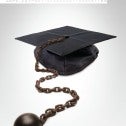 Lou Arab | CUPE Communications
Lou Arab | CUPE Communications
Athabasca University is one of Canada’s largest distant education institutions. The university is moving from a ‘tutor model’ where students have one academic expert on call for all their questions – to a ‘call centre’ model – where students hear a new voice every time they call.
“Athabasca University is devaluing its programs and damaging its reputation by pushing a call centre model for their courses. This leads to a reduced standard of learning for courses that go beyond right and wrong answers,” said Ronnie Joy Leah, spokesperson for CUPE 3911.
Members of CUPE 3911 have launched a website and are asking members of the University community and the public at large to demand better academic standards.
Imagine taking a class where you never get to meet your teacher, and every time you ask for help, you get a new person answering your question. Imagine that the person who marked your essay is different from the person who marked your last test, who is also different from the person who answered your question about the material (who is different from the person who answered your previous question about the material) and who is different from the person who explains why you got the final mark you did.
That’s a scenario facing students at Athabasca. And it’s no picnic for the staff either. Athabasca University tutors have been paid per block of students but are now being asked to engage in piece work – clocking every interaction with students down to the minute – and billing only for the precise, reported times worked.
The website includes an e-postcard which, with a few mouse clicks, can be sent to university officials and provincial government representatives.




